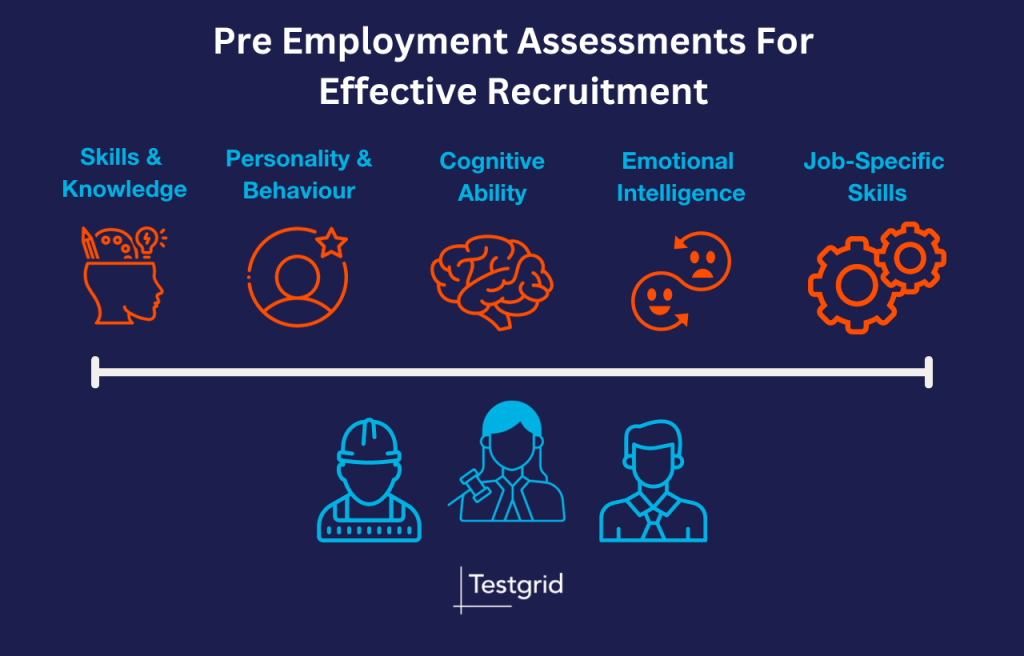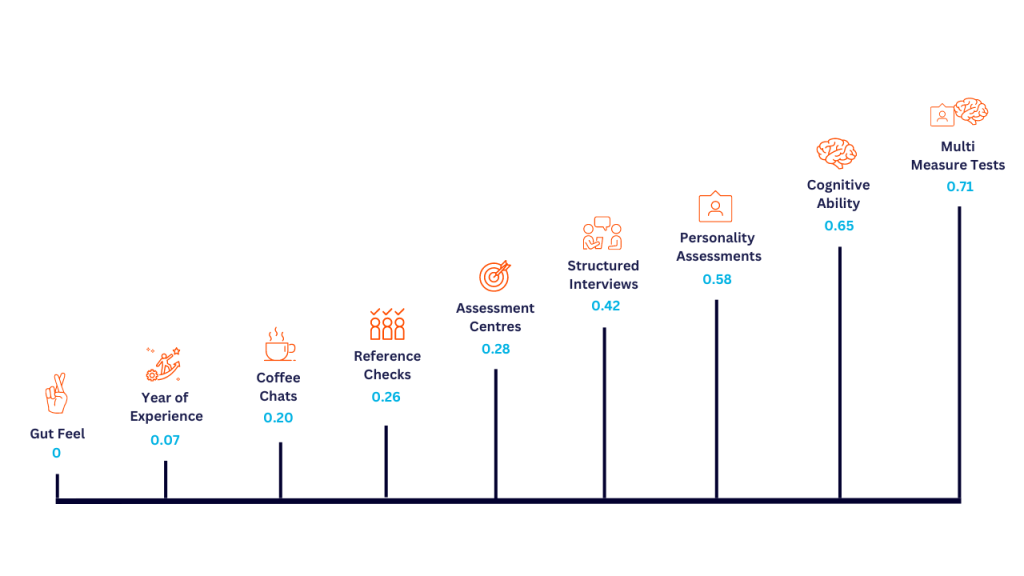Types of Pre-Employment Tests: Definitions and Purpose
Pre-Employment assessments have become a staple in an organisation’s pursuit for the ideal candidate. Traditional methods, such as resumes and interviews are proving too limiting in predicting long-term on the job performance. With the support of research-backed data, employers are seeing the value of a more comprehensive approach that includes these assessments.
In this exploration, we’re taking a deep dive into the defining features of Cognitive Abilities testing, Personality and Behavioural examinations, Emotional Intelligence assessments and Skills and Job-Specific assessments. We’ll be breaking down the definitions and purposes of each assessment style and examining their practical applications.
We’ve done the research. Let us help you introduce the most suitable pre-employment assessments that will help shape a more effective recruitment process with real long-term benefits.

Cognitive Abilities Testing – How does a candidate think?
Cognitive Abilities testing, as one of the more commonly used tests, aims to measure a candidate’s innate mental ability. Offering insight into a candidate’s problem-solving ability, critical thinking skills and learning capability. These assessments generally measure some or all the below:
- Verbal Reasoning
- Numerical Reasoning
- Abstract Reasoning
- Mechanical Reasoning
- Spatial Reasoning
- Logical Reasoning
Cognitive testing is commonly used in the pre-employment testing stage thanks to its ability to predict someone’s potential for success in roles that require complex thinking and decision making.
Given that organisations have unique role requirements, measuring certain metrics may be more relevant than others. In order to get the best value out of a Cognitive Assessment, its important to measure areas that are most applicable to a specific role.
Want to know more about how cognitive aptitude testing can help your organisation? We’ve got you covered.
Personality and Behavioural Assessments – How well will a candidate fit in the role?
Personality Assessments or Behavioural Assessments are designed to measure and evaluate the aspects of an individual’s personality, breaking down traits, characteristics and behavioural patterns.
These assessments aim to assist in matching a candidate to a role based on their personal fit within an organisation. Providing insight into a candidate’s personality and behaviours assists mostly in hiring for cultural fit, as well as measuring a candidate’s alignment to the expectations of a role.
These assessments are best used to measure a candidates personal strengths and areas for development, paving the way for a positive work relationship leading to better job success and satisfaction.
Find out more about how Personality Assessments help you predict job success here.
Emotional Intelligence Assessments – How well will a candidate work with others?
Emotional Intelligence assessments focus on providing insight into a candidate’s ability to perceive, understand, manage and regulate their own and others emotions.
These assessments have seen a rise in popularity in recent years, with many organisations seeing their proven ability to predict on the job performance and even boost employee retention.
Emotional Intelligence assessments are most known for their value in identifying potentially strong leaders. Candidates with higher scores are more likely to build high-performing teams, showcase better resilience and often communicate more assertively.
These assessments are also valuable in measuring a candidate’s response to working in a team environment, assessing their ability to build positive working relationships. They focus on measuring core emotional competencies and how these compare to others.
As an example, in the case of Bond University, we assisted their selection process by introducing an emotional intelligence assessment that aimed to assess a candidate’s empathy and consideration for others. Want to read more about how we helped them select medical students most likely to become good doctors? Take a look at our case study.
Skills Assessments – What skills and proficiencies does a candidate have?
Skills assessments are generally the easiest to define. In a pre-employment space, these assessments are used to measure a candidate’s skill in a specific area that is broadly relevant to a job or task. Unlike Cognitive Ability tests, the intention of these is not to assess the candidate’s potential, rather their current knowledge in selected areas.
They are particularly useful in hiring for roles that require strong technical understanding, often being used to assist hiring in in a variety of skills based roles.
While they are known to have a narrower application, they offer a very broad view of a candidate’s relevant skills. These assessments can sometimes help organisations bridge the gap between resume and reality. Want to learn more about the value of skills-based hiring? Check out our guide.
Job Specific Assessments – How well will a candidate perform in a specific role?
Job-Specific assessments similarly are designed to measure a candidate’s skills in specific areas. The difference however, is that Job-Specific assessments are customised to assess a candidate’s skills in a task uniquely required for a specific role.
Job-Specific assessments are used in pre-employment spaces when there is a need to measure a candidate’s proficiency in a more niche area. An example of this would be in the use of Safety Assessments, where most Blue-Collar environment focus their attention on risk management.
When working in high risk environments, ensuring the safety of your employees is vital. Safety Assessments are used to ensure a candidate is aware of potential safety hazards in a workplace and understands the skills required to mitigate those hazards. In an industry where 80% of workplace incidents are a result of human error, these assessments allow an employer to ensure a candidate has the skills and knowledge to navigate a high-risk environment.
Want to see how we helped a Mining company reduce their Total Recordable Injuries by 28% by using Safety Assessments? Take a look at our recent case study.
Which Pre-Employment Assessments should I use?
The truth is, there is no one size fits all. Our research shows that the best approach is a combination of the above assessment styles that suits your organisation’s needs.
All assessments have their limitations and the best way to gather the most comprehensive evaluation that removes the most bias is to implement a variety of assessment tools that compliment other aspects of the recruitment process.
Our validity scale below is a great demonstration of how multi-measure assessments are the best recipe when it comes to predicting on-the-job performance.

While each assessment can offer valuable insights into a candidate’s on the job performance, they can’t replace other areas of your recruitment process. They can however, go a long way to enhancing it.
If you want to chat with one of our experts about how you can best implement pre-employment assessments into your recruitment process, get in touch with us here.
